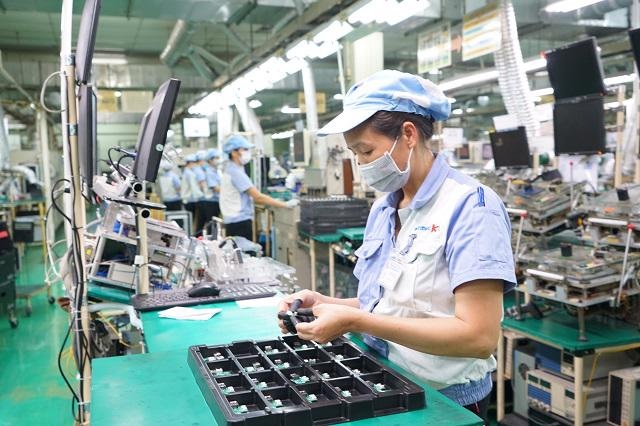Fitch Ratings affirms Vietnam sovereign credit rating at ‘BB’
Fitch Ratings affirms Vietnam sovereign credit rating at ‘BB’
This year, Fitch expects Vietnam’s GDP growth to accelerate to 6.1% in 2022 and 6.3% in 2023 from 2.6% in 2021.
Fitch Ratings has assigned ‘BB’ to Vietnam's Long-Term Foreign-Currency Issuer Default Rating (IDR) with a Positive Outlook.

An electronics production at Katolec Vietnam, Quang Minh Industrial Park, Hanoi. Photo: Pham Hung |
“The affirmation reflects continued strong medium-term growth prospects, despite the Covid-19 pandemic and the global economic spillovers from the war in Ukraine, and strong external finance metrics relative to peers,” noted Fitch in a statement.
The rating, however, remains constrained by contingent liability risks associated with the large state-owned enterprise (SOE) sector and structural weaknesses in the banking sector.
This year, Fitch expects Vietnam’s GDP growth to accelerate to 6.1% in 2022 and 6.3% in 2023 from 2.6% in 2021, led by a recovery in domestic demand, strong exports, and high FDI inflows, particularly in the manufacturing sector.
Vietnam’s economy contracted by 6% year-on-year in the third quarter of 2021 on measures to control a surge in Covid-19 cases. However, economic activity resumed in the subsequent quarter as policy changed to a more flexible approach to the pandemic, made possible by higher vaccination rates; almost the entire adult population of Vietnam is now fully vaccinated.
Risks to the growth outlook remain, including the global economic implications of the war in Ukraine and sanctions on Russia, further pandemic-related shocks, and high commodity prices added Fitch.
In addition, Vietnam's economic prospects remain susceptible to shifts in external demand due to the economy's high degree of openness. But Fitch said the export sector to continue to perform well into the medium term, benefitting from Vietnam's cost competitiveness, trade diversion from China, and implementation of key trade agreements.
Export-related FDI inflows have not weakened despite the supply disruptions in the last third quarter. Inward investment remained strong in 2021 at US$19.7 billion, down marginally from $20 billion in 2020.
“We forecast a reversal to a current account surplus in 2022 and 2023 from a deficit of about 1% of GDP in 2021,” Fitch said.
Another highlight was the improved foreign-exchange reserves in 2021, as the State Bank of Vietnam (SBV) intervened in the foreign-exchange market to stabilize the currency. Foreign-exchange reserves rose further to a record of $109.4 billion by the end-2021, supported by large FDI inflows.
Fitch forecast a gradual appreciation of the exchange rate, in line with the expectation of current account surpluses, although it expected the SBV to intervene in the case of excessive currency volatility or if the currency faces significant upward pressure.
“Vietnam's large external buffers offer a cushion against shocks and support a strong external liquidity ratio, which was 340% at end-2021, above the 175% of the 'BB' median,” Fitch said.


















